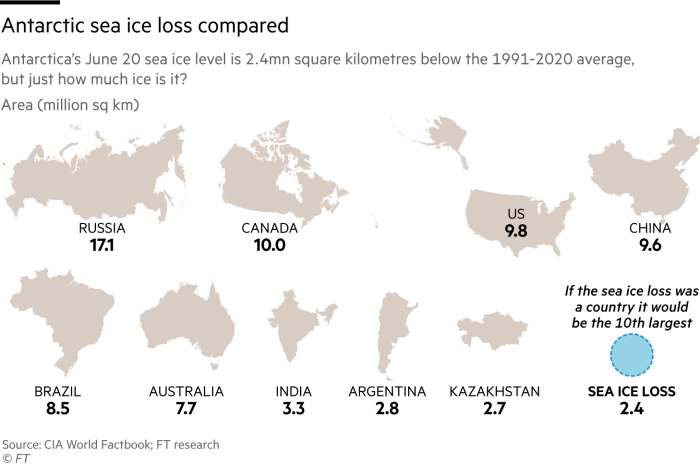Receive free Antarctica updates
We’ll send you a myFT Daily Digest email rounding up the latest Antarctica news every morning.

Antarctic sea ice reached a record low for the month of June, increasing calls from scientists to intensify research and monitoring of the Earth’s polar ice caps.
Despite approaching midwinter in Antarctica, 2023 sea ice levels are 2.4mn sq km below the long-term average for the time of year, according to a Financial Times analysis of data from the Japan-based Arctic Data Archive System.
The area covered is almost 1.1mn sq km less than the same period last year — an area more than four times the size of the UK.
The World Meteorological Organization recently warned that sea ice globally was decreasing at an “unprecedented rate”, with “serious implications” for both polar environments but also global weather and climate.
The body warned that, since 2016, Antarctic sea ice has declined at a rate not observed since satellite records began in the 1970s. In 2022, for the first time on record, some coastal areas became ice-free for the first time in Antarctica as landfast ice experienced “significant loss”, the WMO said.

More than 60 experts from scientific groups affiliated with the WMO co-sponsored World Climate Research Programme called for more research and observation when they met this month after a four-year hiatus during the coronavirus pandemic.
Separately, a study published earlier this month in the journal Nature Communications found that Arctic sea ice could disappear entirely during the month of September as early as the 2030s. Arctic sea ice is typically at its lowest level in September, before building up over the winter.
The paper concluded that human-caused climate change was the leading cause of declining sea ice.

Scientists warned last year that the Arctic was warming four times faster than the rest of the planet, and at a higher rate than previously thought.
Scientists have for a long time known that the Arctic is heating faster than the rest of the planet, but have not agreed on a rate. The warming effect, along with long-term declines in sea ice levels, are considered two major indicators of climate change.
A landmark 2019 report overseen by the Intergovernmental Panel on Climate Change and signed off by 234 scientists from more than 60 countries estimated that the Arctic was warming about twice as fast as the rest of the planet. Global temperatures have risen at least 1.1C since pre-industrial times.
The loss of Arctic snow and ice accelerates warming by reducing the surface area of white cover that reflects the sun’s rays back into space. Instead, rays are absorbed into the earth or sea, causing more heating and in turn triggering more melting of sea ice.
Stay connected with us on social media platform for instant update click here to join our Twitter, & Facebook
We are now on Telegram. Click here to join our channel (@TechiUpdate) and stay updated with the latest Technology headlines.
For all the latest Business News Click Here
For the latest news and updates, follow us on Google News.
